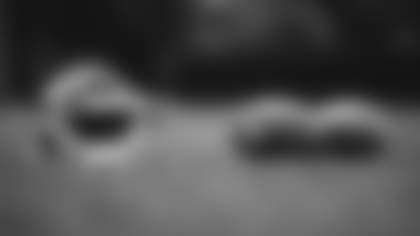
If nice guys finish last, Nick Lowery would lose every race.
During his 18 seasons in the NFL, three with the Jets, the seven-time All-Pro and three-time Pro Bowl kicker totaled 1,711 points. And now, 23 years since his final game, Lowery is scoring more than ever by helping children and adults alike in a variety of ways.
Founder of the Champions for the Homeless foundation, this week the Scottsdale, Arizona, resident donated hundreds of FDA approved COVID-19 antibody tests to homeless people in Phoenix.
"Phoenix is the first city in America to test its homeless population and we're working with the people at St. Vincent De Paul's (Resource Center) with the COVID-19 rapid antibody tests," Lowery said, "which will tell us a lot about the demographics and penetration of this virus, and help the Governor and state folks be more accurate in targeted responsible increments of re-opening up the economy, etc."
The test reportedly checks for protective antibodies through a finger prick of blood in about 15 minutes. The result will determine if the person has negative exposure, recent or current exposure, or antibodies from past exposure to the Coronavirus.
Since retiring from the game in 1997, Lowery has focused on several different causes and how he can help. Not only for communities across the country, but also for his brethren of former NFL players.
"I went to Harvard and studied at the Kennedy School of Government, and I've been doing leadership programs for Native American youth for 23 years and founded NativeVision," Lowery said. "It was a football camp and life skills camp and it's expanded now to seven different sports, and from 10 Native American tribes to 40. It's in partnership with Johns Hopkins Center for American Indian Health.
"And I've hosted for the last five years, events with Banner Health and Barrow and Mayo, looking at the latest science regarding concussions and also CBD and how that's a much more safe and effective means to create and improve what's called neuroplasticity. It's the ability of the neurons in the brain to withstand impacts and reduce far more than any helmet could, the effect of these repeated small hits to the head.
"There are lots of things I love to help out with – anti-bullying programs, working with kids. Kids are kids whether they're Native American or African American or Caucasian or Hispanic. They need to value their purpose in life and the ability to focus. You notice with a lot of today's kids with the conditioning, if you will, of their brains to these phones and computers. Helping them learn to apply themselves to be more focused will help them with everything they do in life."
Focused may be a suitable word to describe Lowery at the beginning of his NFL career. That or persistent. Undrafted out of Dartmouth, he was cut eight times by 11 teams before sticking with the Kansas City Chiefs in 1980 after beating out Hall of Famer Jan Stenerud.
His gridiron adventure, however, began in training camp with the Jets in 1978.
"I had a chance to sign with either Cleveland or New York and I chose New York," Lowery said. "The transition back then, you were using a tee in college, and learning to kick off the ground (in the NFL) is like shifting from hitting a 3-iron off the tee to hitting a wedge. You have to dig deep to get the ball up. And it took time to do that.
"In the third preseason game, we were playing in San Diego and I had two attempts off the dirt infield. I missed both of them and they cut me."
Lowery, who would play in two games for New England in 1978, continued. "When I talk to kids today and adults, I tell them, 'When you have the guts to pursue your dream, there's the fear of success and the fear of failure. You wonder if I'm taking on this dream of mine, if it ends, is that the end of the world?'
"And it took about three days to say, 'You know, (Jets head coach) Walt Michaels doesn't know what I'm made of. I don't necessarily know what I'm made of. I know one thing, though, I've just gotta keep doing this until I get used to the pressure and that unique, highly specialized 1.28 seconds part of kicking.' So, I began to get my confidence back and the next year teams started calling me."
The Chiefs called while Lowery, a Washington, DC native, was working as one of the only non-attorneys on the United States Senate's commerce science and transportation committee working on aviation deregulation and safety. Lowery felt that he owed it to himself to try making it in the NFL one more time.
With Kansas City for 14 seasons, he is the team's all-time leading scorer and a member of the Chiefs Hall of Fame. And even though he was the most accurate kicker of his era, the Chiefs asked Lowery to take a pay cut in 1994.
"When they did that, they had to release me. And when they released me, (the Jets' head coach and their assistant director of pro personnel) Pete Carroll and Pat Kirwan got in touch," Lowery said. "And so, I had to make the hard decision whether to stay there or make a change.
"They had Boomer (Esiason at quarterback) and they had (veterans) Ronnie Lott and Art Monk, and pretty good talent on the team. So, that's what led to that. It was the hardest decision I've ever made."
That was Carroll's first season as a head coach. And after finishing 6-10, it was also his last season as the head coach of the Jets.
"I think most people would agree, if we stayed with Pete Carroll for one more year, things would probably have turned around. But unfortunately, we collapsed in that last month of the season," Lowery said. "Pete was just incredible to play for. He looked to me and Boomer and Ronnie Lott and Art Monk, guys that had played in the league for 14, 15 years, to set the tone.
"Most teams need at least a year to get a couple of the, shall we say, bad apples out. It takes time to figure out the chemistry of a team. You can put the right people on a table, but whether there's that right chemistry is a fine art, not just a science."
What makes Lowery, who was presented with the NFLPA Byron "Whizzer" White Community MVP Award in 1993, most proud of his career?
"I think the thing I'm most proud of is to be dependable. As a kicker, that's the most important thing," Lowery said. "Kickers have to be able to move on, learn, pay attention so you can keep getting better. And then learn the art of forgetting those misses enough to be able to just focus on the next one. That's where the mental toughness comes in."














